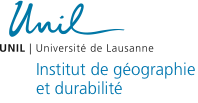Institute of Geography and Sustainability of the University of Lausanne
Research projects
Mega-events as urban interventions: growth and impacts
| Research fields |
Urban matters Sustainable urban development City and economy Cities, policies and environment Politiques urbaines Villes et globalisation Gouvernance urbaine |
| Keywords |
Sport Impacts Sustainable urbanism Project management |
| Funding | Swiss National Science Foundation |
| Duration | August 2017 - July 2019 |
| Website | |
| Researchers |
Müller Martin (Supervision) [web] [email] Leick Annick (Scientific collaborator) Wolfe Sven Daniel (Doctoral student) |
The costs and infrastructural requirements of mega-events such as the Olympic Games and the Football World Cup put them among the single most transformative ventures for cities today. At the same time, their complexity and tendency to exceed budgets make them highly risky undertakings. Despite this, little is known about the impacts of different mega-events across time and the driving factors behind these impacts. This project – Phase 2 of the Swiss National Science Foundation Professorship – proposes to establish the size, costs and impacts of a longitudinal sample of 66 mega-events since 1960 and the driving factors behind these impacts. It will consider three types of mega-events: (1)the Olympic Summer and Winter Games as a uni-local sports event (2)the Football World Cup as a multi-local sports event (3)the World's Fairs (Expos) as a uni-local non-sports event The project is split into two modules. Module 1 will build a database with indicators describing the size, costs and impacts and potential driving factors of the 66 mega-events. For building the database, the module will draw on existing documents from official reports and audits, press releases, media reports and academic studies. The data will be analysed using descriptive and inferential statistics to extract trends and patterns. Module 2 seeks to establish the driving factors behind impacts. For this it works with cross-case comparison and bivariate regression modelling, using different definitions of impacts as dependent variables and a suite of potential driving factors, relating to planning processes, interests, biases, governance and complexity. Module 2 seeks to establish what factors are associated with what kinds of impacts. The project will result in two major innovations. First, it will provide the first longitudinal record on the size, costs and impacts of the largest mega-events. Second, it will contribute to reorienting discussions on what drives impacts in mega-events through exploring a much wider range of antecedents of impacts than previous studies. As a practical implication, the project will provide transparent and comparable information on the impacts of mega-events that a range of stakeholders concerned with bidding for or hosting mega-events – policy-makers, governing bodies, the media, citizens – can draw on to make informed decisions about bidding and hosting.

